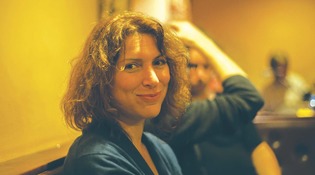
© Stephen Dodd
Annie Dorsen ’96, ’00MFA, explores how computer technology is changing our culture.
View full image
Annie Dorsen ’96, ’00MFA, a Brooklyn-based writer and director, won a 2019 MacArthur Fellowship—the so-called genius award—for messing around with artificial intelligence. She received the $625,000 award for work that often pairs human actors with computers. In Hello Hi There, chatbots debate philosophy, and Yesterday Tomorrow involves singers and computers morphing the Beatles’ love song into the anthem from Annie. In The Great Outdoors, audience members are lying in a planetarium, staring up at stars, while a performer reads texts culled from the internet. Dorsen, who also cocreated and directed the Broadway rock musical Passing Strange, calls her experimental pieces “algorithmic theater.”
Julia Klein: Define algorithmic theater.
Annie Dorsen: Algorithmic theater is about a series of steps that takes inputs and turns them into output. The input is the data I’m using, the raw materials, the source text. And the output is what the audience experiences. In A Piece of Work, Hamlet was the input, and the algorithm that I developed with computer programmers transformed that original source material into the final performance.
JK: And the performance changes each night?
AD: Otherwise, there’d be no point—you might as well just write a play. The interesting part of working with algorithms to create artistic work is that you might arrive at something unexpected that you couldn’t arrive at any other way.
JK: Did you have exposure to experimental theater as an undergrad?
AD: I took a class from Rebecca Schneider [then a theater and performance studies adjunct at Yale; now a professor at Brown] that really changed my view of theater. It was on modern performance techniques—a survey of the big hits of the twentieth-century avant-garde. It was the first time that I really thought seriously about how new forms could create different kinds of content.
JK: How did drama school influence you?
AD: I had this romantic fantasy that I was going into this hotbed of experimentation. I’d never really worked in the theater—I didn’t know how conservative it is. I had the slow realization that I was really at professional school, getting socialized into a certain way of doing things.
At the same time, the training I got is amazing. There are not many theater-makers who do experimental performance work who really know theater history and literature. It’s super relevant for the kind of work I do.
JK: In what way?
AD: I’m thinking about what theater is, and what, historically, theater has done within cultures.
JK: I read that an Alan Turing essay turned you on to algorithms.
AD: Turing said we don’t really know what thinking is, so it’s difficult to imagine we could create [it] in a machine. He thought we should create the illusion of thinking. If you could create a computer able to speak, if that program was convincing enough, we would believe ourselves to be talking to another human. And that would qualify as successful artificial intelligence.
JK: You’ve suggested that both machine learning and
theater raise the contrast between truth and illusion.
AD: Turing was talking about creating the outward appearance of thought. That’s what a playwright does, too. All you have to go on is the language. And, from that, actors, directors, designers all get very busy trying to reverse-engineer a human.
JK: You must have broader concerns about the impact of technology.
AD: I am interested in the relationship between human and computational thinking, the ways in which computer technology is transforming our culture. How are we living with these tools? How are they changing our relationships, our politics, our culture?
JK: You’ve described the internet as “a new Romantic landscape” ripe for exploration. That suggests a positive view of technology.
AD: On the one hand, of course it’s making all kinds of things possible—it’s a fundamental shift in our epistemological universe. [But] it’s hard to know what we mean by positive or negative. It’s like saying, what do we think about electricity?
JK: How has the MacArthur Fellowship changed your life?
AD: It’s amazing! The joke I make is that the MacArthur is like a magic eraser: it takes all of the terrible decisions I’ve made, and it somehow retroactively makes them look like brilliant decisions. It's very encouraging. It says, “Keep going. You're on the right track."
 loading
loading